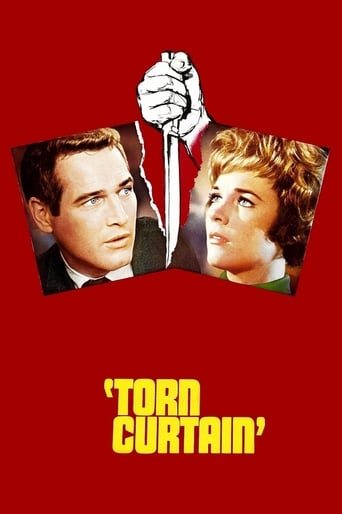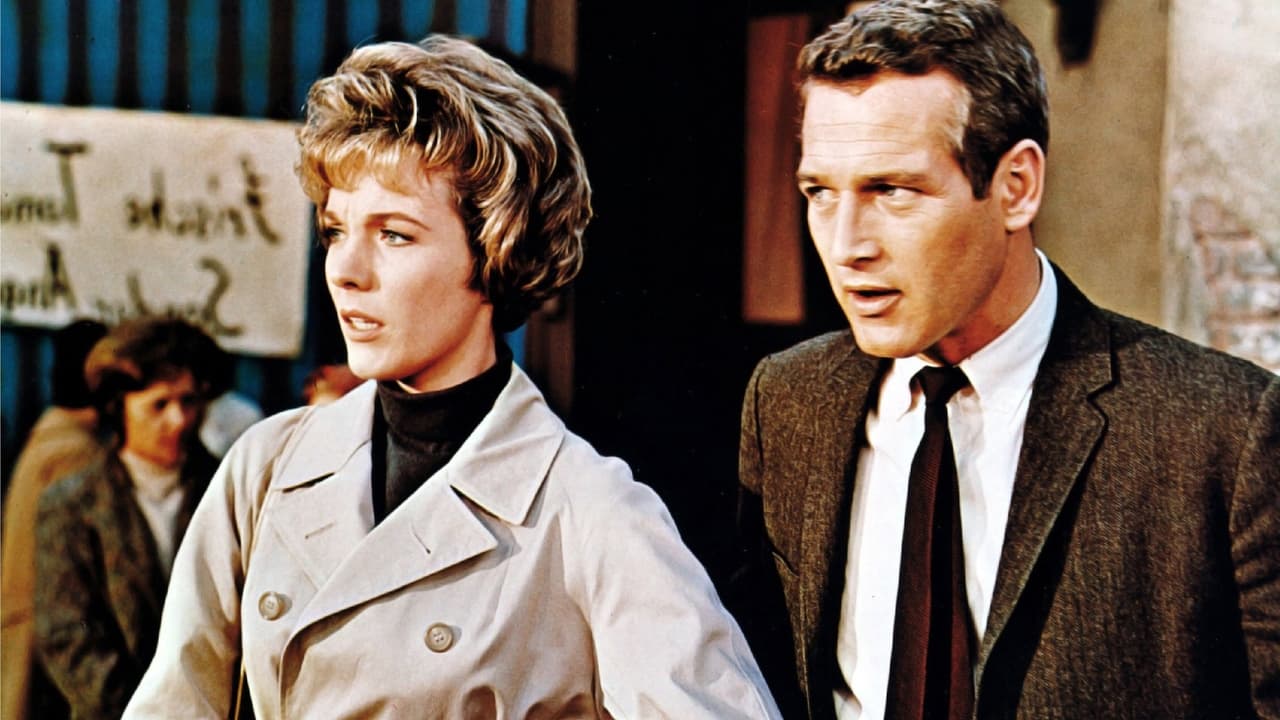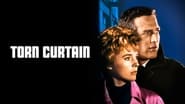dromasca
I love seeing films half a century after their initial releases. It's not only a cinematographic experience that in many cases brings up unexpected gems, but also an opportunity to compare the acting and directing styles, the technical means, and the perspective on events, which some were actuality at the time the films were made and became history since then. In some cases it's also the opportunity to compare a fresh viewing with our own memories about the film, although this is not the case here with Torn Curtain , a late film by Alfred Hitchcock, whose Cold War theme seen from the Western perspective had no chance to pass the filter of the censorship in my native Romania at that time.There are many interesting elements in this story about a an American scientist (Paul Newman,) who plays spying games and simulates a crossing of the lines to East Germany in order to discover the status of a key weapon in the rockets arsenal of the Communist block. When his unknowingly fiancée (Julie Andrews) joins him against his will, his mission becomes more complicated. It's at the same time a psychological thriller (the fight of the minds between the American professor and his East German counterpart), an action movie, and a relationship story with some of the Hitchcock touch. As in many of his films, Hitchcock succeeds wonderfully in the thriller part, partially succeeds (or partially fails) in the action area, and fails completely in the romantic zone.50 years later, the very interesting part of the film is the rendition of the Cold War atmosphere. I have seen several films about that period, some more recent, and I was surprised how well Hitchcock succeeded to catch the feeling of the area without falling in any black-and-white clichés, describing a world close to what I knew, with people living under the pressure of a dictatorship, but still managing to joke, eat, drink, dance even under the scrutiny of the portraits of Karl Marx. There are less credible scenes - for example the whole auto-bus episode (why were these people traveling together at all?), but they belong to the action part of the script. Acting is decent, with Newman and Andrews doing what I remember they were supposed to do, but the most wonderful surprise is a poignant scene with the Russian-born actress Lila Kedrova which some may remember from Zorba the Greek . Her role there was unforgettable, so is the one here if you have the chance to see the film. A few daring Hitchcockian camera takes build the thriller part. A film to watch, especially if you are Hitchcock fans.
ElMaruecan82
It is very revealing when the making of a picture is richer in conflict elements and tension than the plot itself, for "Torn Curtain" never really fulfills the potential of what its elevator pitch might have carried, and ends up as a rather benign take from the Master of Suspense on the then-popular spy thriller sub-genre, starring then box-office stars Paul Newman and Julie Andrews as rocket science professor Michael Armstrong and his secretary and fiancée, Sarah Sherman. Yet despite the romantic introduction of the couple, there's no real chemistry. Actually, there's no chemistry between the actors and the story, in fact, it's like the whole project was estranged to the word 'chemistry'. It appears that Hitchcock was displeased with the script's first draft, feeling it was lacking some spice and humor, despite structural qualities, the second draft was slightly better but caused Newman to express some concerns about his character and the plot. The last person who dared to challenge the Master was "Marnie"'s second writer and he got himself fired for it. But Newman was pushed by the studios, along with Andrews, while Hitch' choice bent towards Anthony Perkins (an aged and soon-to-retire Cary Grant being unavailable) and Eva Marie-Saint who proved her worth in "North by Northwest". You can tell from the movie that Newman knew about Hitchcock's inclinations, and it affected his performance, covering such a wide range of emotions that his focused and confused looks look exactly the same.But Julie Andrews deserved a little better, basically, her performance only consists on emotional reactions. First, she's shocked that her fiancée might be a defector, then she's ecstatic because he's a hero, and after that, she's the usual female follower grabbing her man's arm. Initially, the project was inspired by a real-life adventure of British spies that made Hitch wonder how the wives lived the situation, "Torn Curtain" was supposed to be told from Sarah's perspective with the shadow of mystery on her husband. But the secrecy that surrounds Newman's behavior and the constantly worried look on Andrews' face transfers the interest from the characters to the plot... which is rather tedious and meager in excitement during the first act.So many negative vibes burdened the project and buried its chance to make for a more enthusiastic and heart-pounding film, "Torn Curtain" also marks the last collaboration with Bernard Herrmann who was fired because he couldn't come up with a score that matched Hitch' demands. In the end, you have two undesired lead actors, a script that couldn't be improved because of Andrews' tight schedules, and a score from John Addison that doesn't really stick to your head. Hardly the ingredients of a masterpiece. But the experienced director had a few tricks under his sleeve, and knew he could spice up the tasteless plot with two secret ingredients: supporting actors and creative thrills. And this is how one of the lesser films from Hitchcock afforded the luxury to have one of the most memorable deaths from his films, or any film.The highest point of the film is the gruesome and laborious murder of East German Agent Gromek, that takes almost five minutes (preliminaries included) in order to show how difficult it is to kill a man, especially when you're an amateur or a farmhouse lady, using domestic instruments such as a bowl, a knife, a shovel or an oven. The only inconvenience of that scene is that it deprives the film from one of its most interesting characters, wisecracking gum-chewing Wolfgang Krieg who looked nothing like the cold and manipulative typical Communist. Thankfully, the film wasn't devoid of scene-stealing supporting performances, from Ludwig Donat as the comic-relief Professor Lindt to Lila Kedrova as the bizarrely touching Countess who's desperate to help the couple to flee if they can sponsor them in exchange, although her presence was overplayed, she incarnated people's condition behind the curtain and she left an indelible impression, which is more than what the leading couple did."Torn Curtain" third act is more conventional in Hitchcockian terms, the bus ride to Berlinthe Stasi was one long cat-and-mouse chase with the right balance of suspense and humor and the ballet theater was a fitting setting for the obligatory climax, with the presence of Ballerina (Tamara Toumanova) as a comical and dramatic pay-off. Yet for a film that made killing so hard, it's hard to accept how escaping could be so easy. There's no real feeling that the lives of the protagonists are at stakes, Armstrong marks a secret sign on the ground and doesn't think of erasing it, he gets his formula very easily (which is a letdown as it was the film's "MacGuffin"), he escapes from the campus, the bus and the theater as easily and conveniently as Tintin and Captain Haddock in "The Calculus Affair". And you know what, this wouldn't have mattered if Hitch treated his material like he did with the no-less contrived but more enjoyable "To Catch a Thief", but Hitch didn't care enough to glamorize poor Andrews who had to keep that ugly brownish overcoat all through the picture. At the end, Hitch made this film in a rush and the result met with fair box office success but one of his worst critical reception. A pity because the film can pass as a legitimate Hitchcock picture but instead of seeing the good in it, we'll always look at the better that could have been. Of course, after the extraordinary streak that started with "Vertigo" and ended with "The Birds", it would have been difficult for Hitch to top himself, but I guess that's what viewers expected, but even with modest expectations, the film is a disappointment. It's almost ironic that the making of the film embodied the very Cold War that drove the narrative.
Ed-Shullivan
I respect the director Alfred Hitchcock and the two main stars Paul Newman and Julie Andrews. Who wouldn't? Between the three of them they have 18 Oscar nominations but only two wins. I was really looking forward to watching this thriller that takes us behind the Iron Curtain and which has Paul Newman playing an American scientist who appears to have defected but is actually a double agent and fully engaged in espionage.Early on in the film we observe that while American Professor Michael Armstrong (played by Paul Newman) is boringly involved in bedding down Sarah Sherman (played by Julie Andrews) Professor Armstrong is also engaged in an exchange of hidden notes and messages through telegrams that he opens and reads in different parts of the ship that he is travelling on. You would think that with the addition of a musical score that Hitchcock could build up the suspense but in actuality I was easily distracted and lost interest in the storyline as well as in the lack of chemistry between the two lead actors Newman and Christie.It just goes to show you that even with a great director, and two super star actors unless you can maintain a flow to the film and without a good musical score to match the storyline the audience just cannot buy in. I won't ask for my money back but I would say that Torn Curtain did allow me to organize my paperwork and make a few phone calls as it played in the background because I was not missing anything that was (not) playing on the screen.Sadly I have to rate Torn Curtain a low 4 out of 10.
MisterWhiplash
Torn Curtain is a good little Cold War story involving unlikely spies and lots of traveling through European countries. And of course the thing you'll hear about is that one major set-piece, in the middle of the film, where a Character (with a Capital C) comes over to where Newman and Andrews are trying to lay low, and the first thing is the tension. It's what isn't said here that cuts like a knife, how Newman tries to keep up the cover and the other guy can just sense, taste, what this man is lying about. Finally the struggle happens, and the man is hit on the head. But that's not all. It's the Master of Suspense stretching what he could do in 1966 (the 'Code' was finally loosening, just a little), and it's graphic, rough, and a mini-masterpiece.The rest of the film is... alright. It's not completely forgettable as far as spy thrillers with espionage in the 60's goes, nor a crime against humanity. But, Julie Andrews was miscast here for sure. Paul Newman does okay actually, better than I expected as a professor-turned-Cold-War flip-flopper - though he's not, I think, who cares really - but their on-screen chemistry isn't very strong, which is the film's biggest flaw, especially for the material this filmmaker is working with here. If Newman had a stronger woman to work off of, a different sex appeal or a more realistic counterpart (maybe one of the stars of one of the European waves could have helped), but here...Hitchcock, I think, got this as well, so he got more pleasure out of side/supporting characters, like Ludwig Donath as Prof. Gustav Lindt or the German woman with the colorful scarf who needs a sponsor. It's not a bad movie by any stretch, and it has a nice wonderfully obvious Hitchcock twist (actually a couple) in the last reel. But Torn Curtain could've been more. It's a soup that needed more attention, or another lead actress.



 AD
AD






